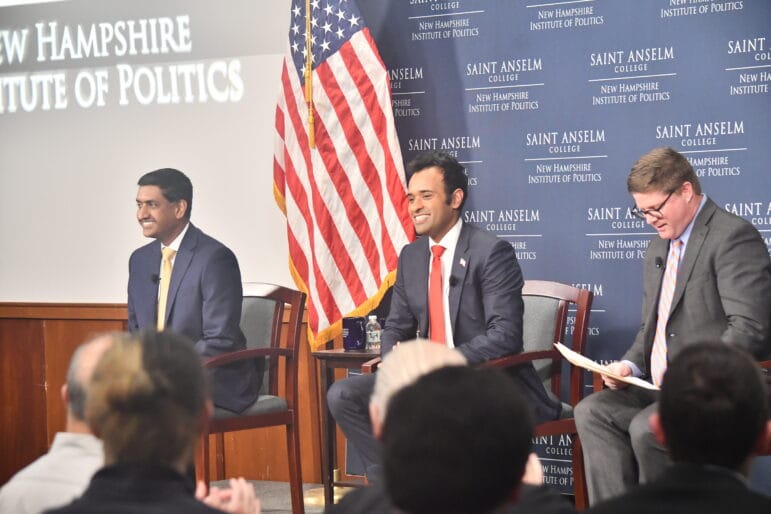Ramaswamy and Khanna clash at NHIOP battle of ideas
U.S. Representative Ro Khanna (D-CA-17) and Republican Presidential Candidate Vivek Ramaswamy met in a debate about America’s future at the New Hampshire Institute of Politics at Saint Anselm College.

GOFFSTOWN, N.H. – What began as an online debate between two national political figures became an in-person discussion on Wednesday morning hearkening back to the political salons of a bygone era.
U.S. Representative Ro Khanna (D-CA-17) and Republican Presidential Candidate Vivek Ramaswamy met in a debate about America’s future at the New Hampshire Institute of Politics at Saint Anselm College. Moderated by Boston Globe Political Reporter James Pindell, for just over an hour the left-wing Khanna and right-wing Ramaswamy traded viewpoints on a variety of topics designed to be more philosophical than the average modern-day political forum.
While both men understandably disagreed on most of the subjects discussed, Khanna repeatedly tried to convince Ramaswamy that the solution to his concerns could lie in liberal policies. When Ramaswamy voiced concerns about the $33 trillion U.S. budget deficit, Khanna said much of that could be eliminated by the erasure of Reagan-era, George W. Bush-era and Trump-era tax cuts that would make wealthy Americans pay more.
Khanna also pushed Ramawamy’s frustrations on over-regulation in the energy sector, stating that the Biden Administration has allowed more oil drilling than any other point in U.S. history and adding that energy prices could be lowered by more investment in renewable energy. There, Ramaswamy countered that many climate activists counterintuitively opposed nuclear energy, which does not produce carbon emissions. Khanna agreed that nuclear energy should not be off the table, but the U.S. should pursue a broad array of energy options while newer cleaner technologies are developed. Ramaswamy did also agree that human activity may be impacting the world’s climate, but carbon emissions would only help plants and the true emergency is ensuring that human needs be met.
Khanna also partially agreed with Ramaswamy in limiting America’s engagement in foreign conflict, but did not agree with Ramaswamy’s approach that all American foreign policy should be strictly limited to immediate American interests. Instead, Khanna believed that American interests are best served by spreading the embodiment of American ideals and positivity with other countries across the world in a responsible manner that stabilizes world affairs. Khanna asked Ramaswamy to request briefings from American intelligence community leaders, feeling that it would change his perspective regarding ideas such as the possibility of pitting Russia against China.
In turn, Ramaswamy’s approach centered around the principles of George Washington’s farewell address in 1796, where America’s first president warned the U.S. should base all foreign policy around U.S. interests in an objective manner and oppose unlimited and intractable alliances that may harm American interests. He also stated that China is America’s greatest enemy.
Ramaswamy challenged Khanna’s support of Joe Biden’s record on the economy, stating that the majority of job growth came from government jobs. Khanna in turn challenged Ramaswamy’s believe that 75 percent of government employees should be terminated and all government employees should have eight-year term limits, stating that this would stop those employees from accumulating the experience they need to properly serve public interest.
Both men agreed that the influence of money in American politics has been negative, with Ramaswamy believing that unlimited money could be spent in support of an idea, but limits on contributions are appropriate in support of candidates and transparency was needed in any spending attempting to influence the public.
Both men also concluded the forum with a sense of hope for America, but noting different challenges that the country faces, with Khanna stating the need for an “American production renaissance” and Ramaswamy believing that a return to a focus on merit and the a refocus on our nation’s similarities rather than differences was needed.





